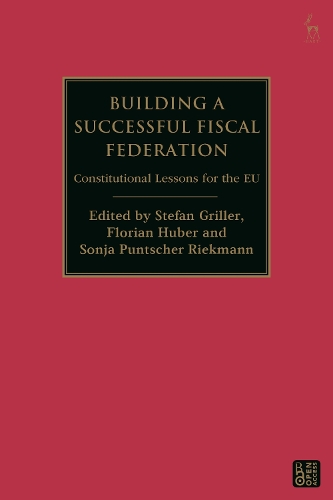
Building a Successful Fiscal Federation: Constitutional Lessons for the EU
(Hardback)
Publishing Details
Building a Successful Fiscal Federation: Constitutional Lessons for the EU
By (Author) Stefan Griller
Edited by Florian Huber
Edited by Sonja Puntscher Riekmann
Bloomsbury Publishing PLC
Hart Publishing
2nd April 2026
United Kingdom
Classifications
Professional and Scholarly
Non Fiction
Constitutional and administrative law: general
Physical Properties
Hardback
528
Width 156mm, Height 234mm
Description
This open access book analyses the fiscal constitutions of developed, democratic Western federations that can offer a model for a future EU fiscal federalism.
The 2009-18 sovereign debt crisis revealed the urgency to overhaul the fiscal architecture of the EU to protect the Eurozone. In the book, national experts analyse the fiscal architecture of Australia, Austria, Belgium, Canada, Germany, Switzerland, and the USA as key examples of federated entities that exercise autonomy in fiscal matters. Throughout their histories, these federations have faced political clashes between centre and periphery or among sub-federal entities which are reminiscent of current conflicts in the EU. Moreover, in times of crisis such as wars, the COVID-19 pandemic, or asymmetric economic shocks, their fiscal systems have been put under stress in comparable ways to the EU.
An interdisciplinary team of lawyers, political scientists, and economists uses the analysis of the sample federal states to provide concrete reform suggestions applicable to the EU. Thus, the book offers food for thought for researchers and advanced students, as well as for practitioners in the areas of administration and politics, to make the EU fiscal architecture more resilient in the face of future crises.
The ebook editions of this book are available open access under a CC BY-NC-ND 4.0 licence on bloomsburycollections.com.
Author Bio
Stefan Griller is Professor of European Law and Research Fellow at the Institute for European and International Law, Vienna University of Economics and Business, Austria.
Florian Huber is Professor of Economics at the University of Salzburg, Austria.
Sonja Puntscher Riekmann is Research Fellow at the Salzburg Centre of EU Studies SCEUS, Austria.
